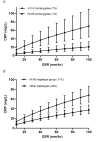A genetic association study of serum acute-phase C-reactive protein levels in rheumatoid arthritis: implications for clinical interpretation
- PMID: 20877716
- PMCID: PMC2943443
- DOI: 10.1371/journal.pmed.1000341
A genetic association study of serum acute-phase C-reactive protein levels in rheumatoid arthritis: implications for clinical interpretation
Abstract
Background: The acute-phase increase in serum C-reactive protein (CRP) is used to diagnose and monitor infectious and inflammatory diseases. Little is known about the influence of genetics on acute-phase CRP, particularly in patients with chronic inflammation.
Methods and findings: We studied two independent sets of patients with chronic inflammation due to rheumatoid arthritis (total 695 patients). A tagSNP approach captured common variation at the CRP locus and the relationship between genotype and serum CRP was explored by linear modelling. Erythrocyte sedimentation rate (ESR) was incorporated as an independent marker of inflammation to adjust for the varying levels of inflammatory disease activity between patients. Common genetic variants at the CRP locus were associated with acute-phase serum CRP (for the most associated haplotype: p = 0.002, p<0.0005, p<0.0005 in patient sets 1, 2, and the combined sets, respectively), translating into an approximately 3.5-fold change in expected serum CRP concentrations between carriers of two common CRP haplotypes. For example, when ESR = 50 mm/h the expected geometric mean CRP (95% confidence interval) concentration was 43.1 mg/l (32.1-50.0) for haplotype 1 and 14.2 mg/l (9.5-23.2) for haplotype 4.
Conclusions: Our findings raise questions about the interpretation of acute-phase serum CRP. In particular, failure to take into account the potential for genetic effects may result in the inappropriate reassurance or suboptimal treatment of patients simply because they carry low-CRP-associated genetic variants. CRP is increasingly being incorporated into clinical algorithms to compare disease activity between patients and to predict future clinical events: our findings impact on the use of these algorithms. For example, where access to effective, but expensive, biological therapies in rheumatoid arthritis is rationed on the basis of a DAS28-CRP clinical activity score, then two patients with identical underlying disease severity could be given, or denied, treatment on the basis of CRP genotype alone. The accuracy and utility of these algorithms might be improved by using a genetically adjusted CRP measurement.
Conflict of interest statement
The authors have declared that no competing interests exist.
Figures

Comment in
-
CRP gene variants complicate diagnosis and treatmentof inflammatory conditions.Nat Rev Rheumatol. 2010 Dec;6(12):676. doi: 10.1038/nrrheum.2010.188. Nat Rev Rheumatol. 2010. PMID: 21166084 No abstract available.
References
-
- Miller DT, Zee RY, Suk DJ, Kozlowski P, Chasman DI, et al. Association of common CRP gene variants with CRP levels and cardiovascular events. Ann Hum Genet. 2005;69:623–638. - PubMed
-
- Crawford DC, Sanders CL, Qin X, Smith JD, Shephard C, et al. Genetic variation is associated with C-reactive protein levels in the Third National Health and Nutrition Examination Survey. Circulation. 2006;114:2458–2465. - PubMed
-
- Kathiresan S, Larson MG, Vasan RS, Guo CY, Gona P, et al. Contribution of clinical correlates and 13 C-reactive protein gene polymorphisms to interindividual variability in serum C-reactive protein level. Circulation. 2006;113:1415–1423. - PubMed
-
- Lange LA, Carlson CS, Hindorff LA, Lange EM, Walston J, et al. Association of polymorphisms in the CRP gene with circulating C-reactive protein levels and cardiovascular events. JAMA. 2006;296:2703–2711. - PubMed
Publication types
MeSH terms
Substances
Grants and funding
LinkOut - more resources
Full Text Sources
Medical
Research Materials
Miscellaneous

